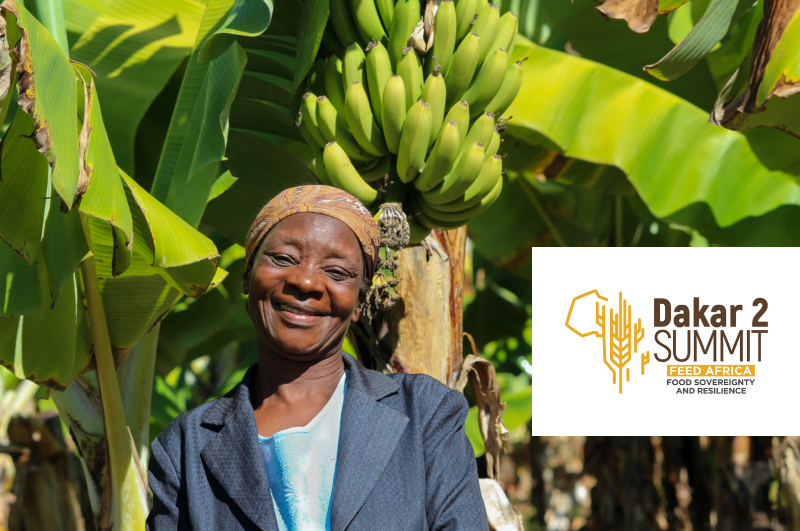

‘Food sovereignty should be our new weapon of freedom."- Chairperson of the African Union Commission, Moussa Mahamat
The second Africa food summit in Diamniadio, Senegal ended on Friday 27th, January 2023 (dubbed Dakar 2 Summit). The latest summit was held eight years after the first Dakar Summit in 2015 during which the Feed Africa: Strategy for Agricultural Transformation in Africa (2016-2025) of the African Development Bank Group was proposed. The 3-day Dakar 2 Summit—under the theme ‘Feed Africa: food sovereignty and resilience’, brought together key stakeholders, including heads of state, development partners, and private sector participants. It strategically aimed to map plans to unlock Africa’s food-producing potential, mobilize political commitment, development partner support, and private sector investment to harness Africa's food and agriculture potential. The summit included plenary sessions and roundtable discussions on key messages for improving food security in Africa.
The summit came at a time when Africa as a continent is grappling with severe food insecurity with agricultural production in recent times, having remained lower than the rest of the world. For example, the latest statistics by World Food Programme show that in drought-affected areas of Kenya, Ethiopia, and Somalia, 22 million people are acutely food insecure and 5.1 million children are acutely malnourished. In Nigeria, nearly 25 million people are at risk of facing hunger between June and August 2023 (lean season) if urgent action is not taken. To address the immediate challenges of food insecurity prompted by the climate crisis, conflicts, skyrocketing commodity prices, and export disruptions, stakeholders need to agree on urgent remedial actions. As a solution, movements for climate justice and African food producers must urgently join forces to eliminate the dependence on food imports and realise food sovereignty across the continent to respond to the looming food crisis.
Several African Heads of State convened meetings to mobilize and align government resources, development partners and private sector financing to unleash Africa’s food production potential with development partners agreeing to commit $30 billion to back the continent’s resolve to boost agricultural productivity and become a breadbasket for the world. The president of Tanzania noted that through a programme initiated in the country called Build a Better Tomorrow for Youth and Women, they had set aside 680,000 hectares of land to be allocated to women and youth for agricultural use, looking to feed the continent towards achieving Agenda 2030. The Senegal president on the other hand noted that the increasing food insecurity to the soaring inflation and rising prices, placing heavy pressure on the continent’s budget. He asserted the dire need for Africa to stop importing food products and start to feed itself.
The African Development Bank (AfDB), one of the co-organizers of the summit, noted that investing in increased agricultural productivity, supporting infrastructure, climate-resilient agricultural systems, and with private sector investment along the food value chain, can help make Africa a breadbasket for the world. The president of AfDB noted that Africa needs around USD 1.5 billion through 2030 to mitigate the impacts of the Russian-Ukrainian conflict on the food and agriculture sector in Africa. In this respect, the AfDB has launched the African Emergency Food Production Facility, with a total finance of USD 1.5 billion, that aims to provide 20 million African smallholder farmers with certified seeds and to increase access to agricultural fertilisers to produce 38 million tons of food.
The summit adopted a Declaration on the implementation of the Summit’s resolution, to be submitted to the African Union. In the Dakar 2 Declaration, the leaders agreed to allocate at least 10% of public expenditure to increase funding for agriculture in line with Malabo Declaration, made at the African Union Summit in Malabo, Equatorial Guinea in 2014. They also resolved to deploy robust production packages by investing in innovations in agricultural technology and infrastructure.to boost productivity and increase resilience to achieve food security and self-sufficiency.
Related Articles
Select Payment Method
Pay by bank transfer
If you wish to make a donation by direct bank transfer please contact Fr Paul Hamill SJ treasurer@jesuits.africa. Fr Paul will get in touch with you about the best method of transfer for you and share account details with you. Donations can be one-off gifts or of any frequency; for example, you might wish to become a regular monthly donor of small amounts; that sort of reliable income can allow for very welcome forward planning in the development of the Society’s works in Africa and Madagascar.
Often it is easier to send a donation to an office within your own country and Fr Paul can advise on how that might be done. In some countries this kind of giving can also be recognised for tax relief and the necessary receipts will be issued.

